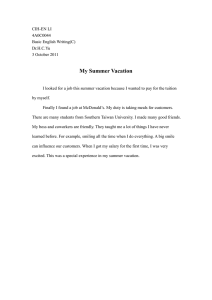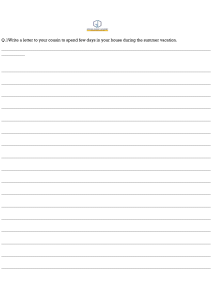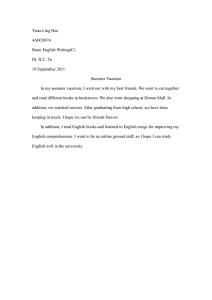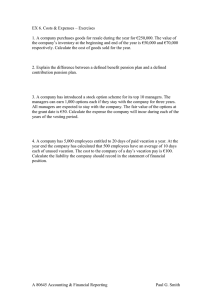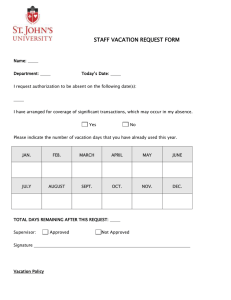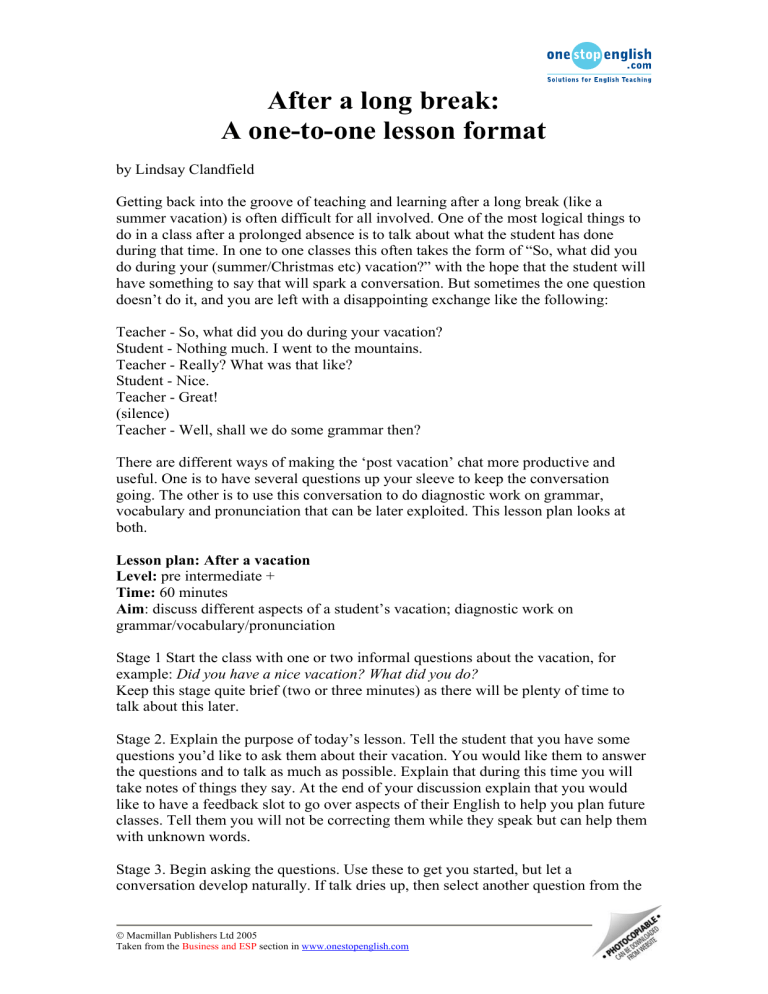
After a long break: A one-to-one lesson format by Lindsay Clandfield Getting back into the groove of teaching and learning after a long break (like a summer vacation) is often difficult for all involved. One of the most logical things to do in a class after a prolonged absence is to talk about what the student has done during that time. In one to one classes this often takes the form of “So, what did you do during your (summer/Christmas etc) vacation?” with the hope that the student will have something to say that will spark a conversation. But sometimes the one question doesn’t do it, and you are left with a disappointing exchange like the following: Teacher - So, what did you do during your vacation? Student - Nothing much. I went to the mountains. Teacher - Really? What was that like? Student - Nice. Teacher - Great! (silence) Teacher - Well, shall we do some grammar then? There are different ways of making the ‘post vacation’ chat more productive and useful. One is to have several questions up your sleeve to keep the conversation going. The other is to use this conversation to do diagnostic work on grammar, vocabulary and pronunciation that can be later exploited. This lesson plan looks at both. Lesson plan: After a vacation Level: pre intermediate + Time: 60 minutes Aim: discuss different aspects of a student’s vacation; diagnostic work on grammar/vocabulary/pronunciation Stage 1 Start the class with one or two informal questions about the vacation, for example: Did you have a nice vacation? What did you do? Keep this stage quite brief (two or three minutes) as there will be plenty of time to talk about this later. Stage 2. Explain the purpose of today’s lesson. Tell the student that you have some questions you’d like to ask them about their vacation. You would like them to answer the questions and to talk as much as possible. Explain that during this time you will take notes of things they say. At the end of your discussion explain that you would like to have a feedback slot to go over aspects of their English to help you plan future classes. Tell them you will not be correcting them while they speak but can help them with unknown words. Stage 3. Begin asking the questions. Use these to get you started, but let a conversation develop naturally. If talk dries up, then select another question from the © Macmillan Publishers Ltd 2005 Taken from the Business and ESP section in www.onestopenglish.com list. It’s also important at this stage to respond to the student’s contributions and not correct. While the student is talking make notes under the following headings: Grammar Write down here: • any persistent grammar problems • particularly good structures • simple structures that could be expressed better Vocabulary Write down here: • lexical mistakes • expressions that the student could have used • words that the student used in their own language (L1) • really good words that the student used Pronunciation Write down here: • common pronunciation errors • examples of good pronunciation Note: it’s sometimes difficult to listen and take notes at the same time! It’s a useful skill to develop though, especially with small classes. At first you only need to note down one or two things. If even this proves really hard, then restrict yourself to one or two areas only. Optional procedure: record this conversation with the student. Then use the same recording later to do feedback. Stage 4. Once the conversation has run its course go over some of the points you made during stage 3. It’s a good idea to balance the feedback on errors with praise on specific examples of good language use. Stage 5. With the student, negotiate which area you’ve highlighted he/she would like to focus on in the next class. Plan your next class accordingly. One of the risks in one to one teaching is the lack of connection between one “conversation” class and the next. Coming back to an earlier conversation in a following class can help make that link between lessons and measure progress. © Macmillan Publishers Ltd 2005 Taken from the Business and ESP section in www.onestopenglish.com After a long break QUESTIONS The following questions are divided into “thematic” sections. Vacation away Did you have a vacation this (summer/Christmas…)? Did you go anywhere? Where did you go? Where did you stay? What did you have to eat? and to drink? Was it the first time you’d been there? Did you see anything really interesting? Tell me about it. Did you meet any interesting people? Could you describe them to me? If you had to describe your vacation with three adjectives, what would they be? Vacation at home What did you do during your vacation? Did anyone come and visit you? Tell me about them. Some people take advantage of the vacation to do things around the house (e.g. home repair, changing furniture; painting). Did you do anything like that? What’s the best part of the vacation if you don’t go away? Did you relax more? Sleep more? Eat more? Vacations in general and vacation time Do you usually go away during the vacation? How many days did you have? Do you always have the same amount of vacation time? How much vacation time should people have per year? English on vacation Did you speak English during the vacation? Did you hear any English spoken? Where? When you go on vacation, do you need English? What for? Research says that more English is spoken between non native speakers than between native speakers. When you’ve used English on vacation has it been with native or non native speakers? Vacation recommendations If I had a three week vacation coming soon, would you suggest I do the same as you? Where would you recommend for a vacation in your country? Do a lot of people come to your country during the vacation? What do they visit? Vacations in the past How different was this vacation to others you’ve had? What was the best vacation you’ve ever had? How were vacations for you when you were a child? © Macmillan Publishers Ltd 2005 Taken from the Business and ESP section in www.onestopenglish.com
